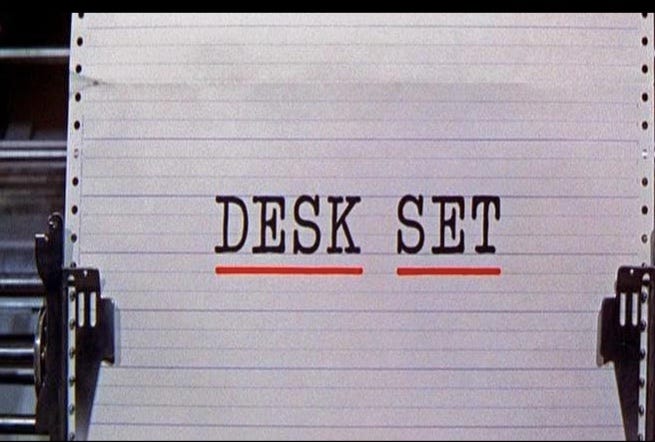With the rumor last week that half of the researchers at the Washington Post’s already shrunken research desk had taken a buyout, I realize that I needed, once again, to defend the key role of news researcher in these fact-starved times. In the early 2000s there were 15 full and part time researchers on the Washington Post research desk—our Desk Set. Somehow, I doubt that any job postings to replace the Washington Post researchers will be forthcoming.
In a post last week, I described an investigation and database on post-9/11 terrorism prosecutions that involved more than a decade of research and reporting by Trevor Aaronson and me. My inspiration in launching this Substack site was to show and tell to readers the tools, skills and tricks of my trade as a researcher and fact-checker for newsrooms and non-fiction authors. I wanted to show the most complex work, the highest level of skills, and to show off the recognition the project earned.
But the general realities of the business cannot be ignored. You can’t do great work if you don’t have job. What’s the future of news research? Possibly, some positions will be created that involve technology skills, such as Artificial Intelligence (AI) or trendy “open source investigations,” as if the researchers would be incapable of that job. (That will be the topic of a lengthy future article. Watch for it).
Many newsroom leaders have determined that news researchers are unnecessary. After all, we’ve now had twenty-five years of Google searching and twenty-two years of Wikipedia. Information is easy and wants to be free. Am I right?
No. Googling is a poor and perilous substitute for news research.
In News Research 101, I explain how researchers approach our assignments and what are the steps we take to find the best answers, data and facts — the facts that we know will be published for millions of readers to see—or hear:. (Our work is instrumental for podcasts too.)
Note that I do not call what I do “searching,” I call it “finding.”
If you just keep searching and searching and searching (and let me admit I have spent more time in rabbit holes than anyone), what’s the point? You stop when you find the answer, the best answer. Eureka! I have found it! On deadline that matters.
If you’ve never worked with a researcher in a newsroom, you may not know what we do. We’re not just Googling and getting a first page of “sponsored” results.
Researcher Roles
The researcher combines a multiplicity of roles in a news organization that help weave together the reporting, curating, and story-telling enterprise.
Research: We answer questions, and provide the sources for the research results.
Trainer: showing reporters how to use the research tools we’ve obtained
Gatekeeper: we have the passwords to “costly” subscription services, like Nexis, Factiva, Accurint, PACER, Spokeo, Trint, etc.
Analyst: We gather data and information, and organize and try to make some sense of it
Subject Expertise/Specialized Knowledge: individual researchers are valued for expertise in languages, sports, campaign finance, history, popular music etc.
Detective: We can find anyone. Period.
Backgrounding: Beyond people finding, we compile information on their academic, military and work histories
Collaborator: We work closely with reporters and editors on daily stories and long term projects
Administrator: The “library” requires purchasing books, journals and online subscriptions, tracking research requests and hours worked by the staff, etc.
Contributor: When assigned to write for the paper or web site, we can do that, too.
Freelance network: We have a network of researchers and factcheckers to bring in for temporary and project work.
Confidentiality: When asked, we won’t tell one reporter what the other reporter is working on.
Remove the thread of researchers from the fabric of the news enterprise and the resulting journalism is sure to suffer.
Whatever the economic model of the news organization (eg subscription, advertising, non-profit), news research is fundamental.
Research Mindset
A research or factchecking request requires a thought process. How will you find the answer? This is what I do:
Think about what your answer will look like.
Who will have the answer/document?
What format? Spreadsheet, letter, etc.
Use ADVANCED search features
What keywords will be in your answer?
Will it be online?
Does it exist?
Research and Investigation Sources
There are a multitude of sources to consider, beyond Google. I will go into them in more detail in upcoming posts and hope to catch your interest. Check out the links to sample the possibilities. They include:
News
The Washington Post and Wall Street Journal on Factiva, but you need a subscription!
Company info
Global search of corporate entities and officers at OpenCorporatesIndustry Organizations
Scientific and academic papers
International law
World Legal Information InstituteCourts/legal
Search US Supreme Court justices’ financial disclosures, from ProPublicaCommodity and shipping/trade information
Statistics
World health statistics and data from the World Health OrganizationSocial media
Geographic information
People finding tools
One of the subscription based lookups for addresses and phone numbers is SpokeoFee-based subscription sources
As you can see, many of the sources I use to find information quickly and accurately, if not government-created, require subscriptions and payment. Usually, the researcher staff selected the best fee-based resources and managed subscriptions, use and payments.
Mastering even one of these sources is a challenge. The skilled news researcher is fluent with many of them.
Tools and Skills
I hope to introduce you to the variety of information sources available online and in brick and mortar locations such as archives and academic libraries, .
“OSINT” Open Source Intelligence = Research, more on this later
Nexis/Lexis/Factiva/Westlaw
ProQuest/JStor
ProQuest (see above) and JStor for academic articles, may be available with your public library card, or in the library.Court records
PACER (Public Access to Court Electronic Records) for federal bankruptcy, civil and criminal cases since the mid-1990s). Get dockets and documents, for a fee. Before that, paper records are in archives.Government documents & datasets
Corporate records
Real estate records
District of Columbia Recorder of Deeds: online access to its document images and index information from August 1921 to the presentScience/Medical Literature
Leaks and hacks
See Micah Lee’s new book, Hacks, Leaks, and Revelations: The Art of Analyzing Hacked and Leaked Data.FOIA Reading Rooms (eg. Defense Department online reading room
I’m planning in the future to add more links from my monster bookmark list to help you build a toolbox of accurate and reliable information sources to use when projects loom or breaking news strikes.
And I learn about new sources of specialized information all the time from people like you.
What is in Your Toolbox?
If you’d like to continue a conversation in the comments, please do !
Happy New Year!






So well done, as always.
I remain a fan.